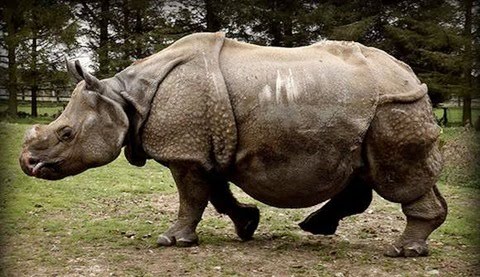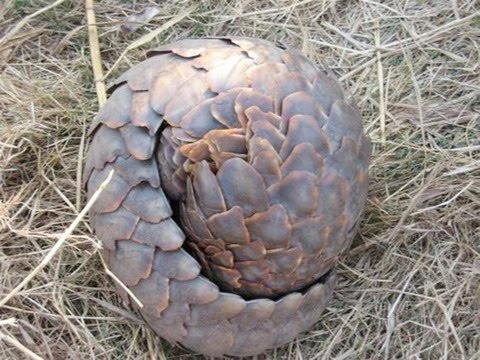Armored Animals shows how the bodies of some animals are saved from being a meal for predators by such physical traits as tough skin, shells, spines, or horns.
Indian Rhinoceros
These massive beasts have some noticeable physical differences from their African relatives. Their segmented hide looks like a formidable coat of natural body armor. It functions a bit like one also: Flexible skin between the thicker hide “plates” allows them to shift as the rhinoceros moves.
Indian Rhinoceros
Thorny Devil
The Thorny Devil is on average about 20 cms long, and they feed on a wide variety of ants. An intimidating array of spikes cover the entire upper side of the body, these thorny scales are a defence against predators. Camouflage and deception may also be used to evade predation. Despite its appearance, it is totally harmless.
Thorny Devil
Three-banded armadillo
The skin is modified to form a double-layered covering of horn and bone over many of the surfaces. Three-banded armadillos are blackish brown in color. Most animals have three moveable bands, although some possess only two, and others may have four. Members of the genus Tolypeutes are the only armadillos that can completely enclose themselves in their own shell by rolling into a ball.
Three-banded armadillo
Pangolin
The pangolin (also called the scaly anteater) is an unusual mammal that is covered with tough, protective scales made of keratin. The pangolin has scales that cover everything except the belly, snout, eyes, ears, and undersides of the limbs. The pangolin has short legs with huge claws; it uses its claws to dig into ant hills and termite mounds. The sticky tongue is up to 27 inches long. The pangolin ranges from 24-62 inches long. The pangolin has no teeth. The long tail is prehensile; the pangolin can even hang from its tail.
Pangolin
Alligator Snapping Turtle
Alligator snapping turtles are the largest freshwater turtles. They weigh between 155 and 175 pounds (70 to 80 kg). They are characterized by three large, pronounced ridges, or keels, that run from the front to the back of the carapace. With powerful jaws and a large head, they are unique among snapping turtles for having eyes on the side of the head. The alligator snapping turtle looks very primitive and has been called the dinosaur of the turtle world.
Alligator Snapping Turtle










No comments:
Post a Comment